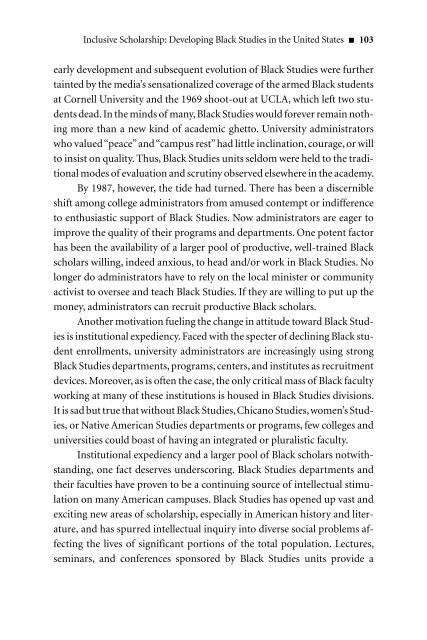Inclusive Scholarship: Developing Black Studies - Ford Foundation
Inclusive Scholarship: Developing Black Studies - Ford Foundation
Inclusive Scholarship: Developing Black Studies - Ford Foundation
You also want an ePaper? Increase the reach of your titles
YUMPU automatically turns print PDFs into web optimized ePapers that Google loves.
<strong>Inclusive</strong> <strong>Scholarship</strong>: <strong>Developing</strong> <strong>Black</strong> <strong>Studies</strong> in the United States 103<br />
early development and subsequent evolution of <strong>Black</strong> <strong>Studies</strong> were further<br />
tainted by the media’s sensationalized coverage of the armed <strong>Black</strong> students<br />
at Cornell University and the 1969 shoot-out at UCLA, which left two students<br />
dead. In the minds of many, <strong>Black</strong> <strong>Studies</strong> would forever remain nothing<br />
more than a new kind of academic ghetto. University administrators<br />
who valued“peace”and“campus rest”had little inclination, courage, or will<br />
to insist on quality. Thus, <strong>Black</strong> <strong>Studies</strong> units seldom were held to the traditional<br />
modes of evaluation and scrutiny observed elsewhere in the academy.<br />
By 1987, however, the tide had turned. There has been a discernible<br />
shift among college administrators from amused contempt or indifference<br />
to enthusiastic support of <strong>Black</strong> <strong>Studies</strong>. Now administrators are eager to<br />
improve the quality of their programs and departments. One potent factor<br />
has been the availability of a larger pool of productive, well-trained <strong>Black</strong><br />
scholars willing, indeed anxious, to head and/or work in <strong>Black</strong> <strong>Studies</strong>. No<br />
longer do administrators have to rely on the local minister or community<br />
activist to oversee and teach <strong>Black</strong> <strong>Studies</strong>. If they are willing to put up the<br />
money, administrators can recruit productive <strong>Black</strong> scholars.<br />
Another motivation fueling the change in attitude toward <strong>Black</strong> <strong>Studies</strong><br />
is institutional expediency. Faced with the specter of declining <strong>Black</strong> student<br />
enrollments, university administrators are increasingly using strong<br />
<strong>Black</strong> <strong>Studies</strong> departments, programs, centers, and institutes as recruitment<br />
devices. Moreover, as is often the case, the only critical mass of <strong>Black</strong> faculty<br />
working at many of these institutions is housed in <strong>Black</strong> <strong>Studies</strong> divisions.<br />
It is sad but true that without <strong>Black</strong> <strong>Studies</strong>,Chicano <strong>Studies</strong>,women’s <strong>Studies</strong>,<br />
or Native American <strong>Studies</strong> departments or programs, few colleges and<br />
universities could boast of having an integrated or pluralistic faculty.<br />
Institutional expediency and a larger pool of <strong>Black</strong> scholars notwithstanding,<br />
one fact deserves underscoring. <strong>Black</strong> <strong>Studies</strong> departments and<br />
their faculties have proven to be a continuing source of intellectual stimulation<br />
on many American campuses. <strong>Black</strong> <strong>Studies</strong> has opened up vast and<br />
exciting new areas of scholarship, especially in American history and literature,<br />
and has spurred intellectual inquiry into diverse social problems affecting<br />
the lives of significant portions of the total population. Lectures,<br />
seminars, and conferences sponsored by <strong>Black</strong> <strong>Studies</strong> units provide a

















